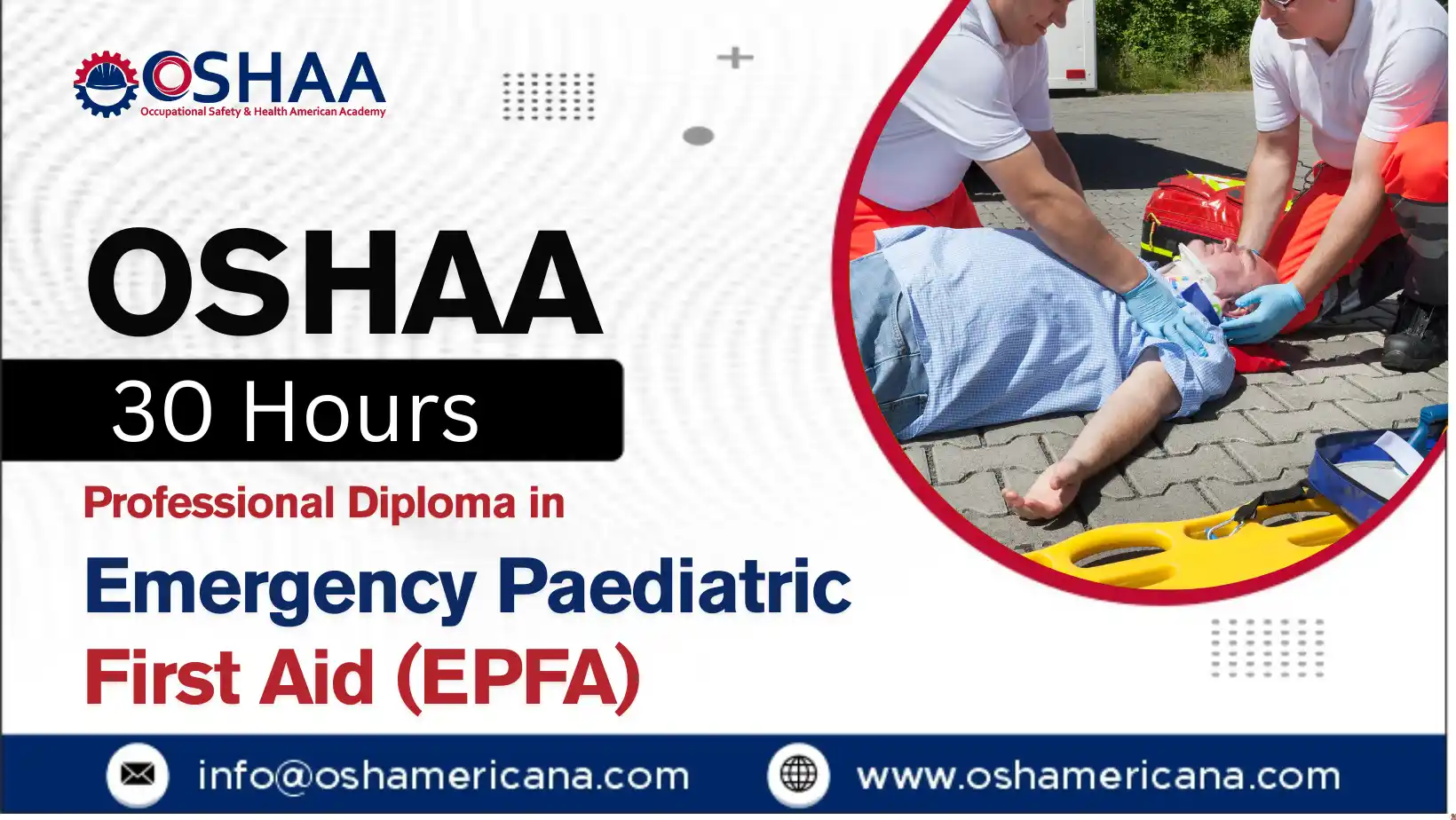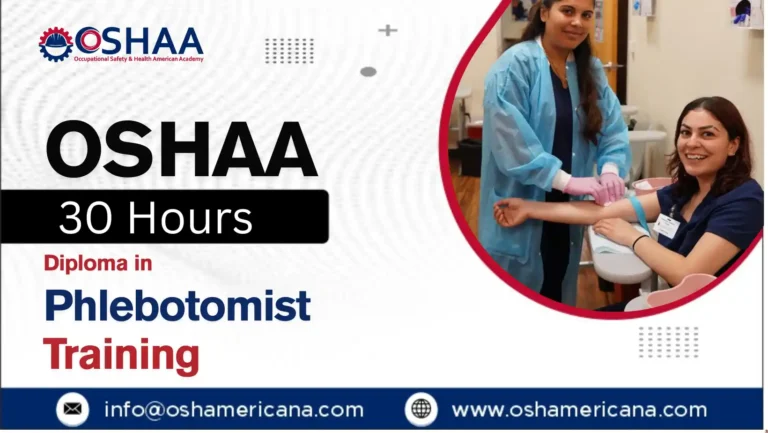The OSHAA 30-Hours Professional Diploma in Emergency Paediatric First Aid (EPFA) is a comprehensive training programme designed to equip participants with essential skills to handle medical emergencies involving infants and children. Delivered in alignment with international safety and childcare standards, this course ensures that participants gain the confidence and competence required to respond effectively in critical situations.
This diploma focuses on the unique requirements of paediatric first aid, covering both emergency response techniques and preventative safety measures. Through practical exercises, scenario-based learning, and expert-led instruction, participants develop the ability to act quickly and appropriately during incidents involving young children.
The course content includes key areas such as assessing emergencies, managing unconscious children, providing CPR for infants and children, controlling bleeding, treating burns and injuries, and handling medical conditions such as asthma, seizures, and allergic reactions. Participants also learn how to recognise early signs of illness or distress and provide safe, effective intervention until professional medical help is available.
By the end of the programme, participants will be capable of managing a wide range of paediatric emergencies in diverse environments, including schools, nurseries, community centres, and private care settings. The skills gained from this diploma not only enhance workplace safety but also contribute to safeguarding the health and well-being of children in everyday life.
The OSHAA 30-Hours Professional Diploma in Emergency Paediatric First Aid (EPFA) is an ideal qualification for those working or aspiring to work in childcare, education, healthcare, and community services. It offers internationally recognised skills that are highly valued by employers and essential for ensuring child safety in professional and personal environments.
OSHAA 30-Hours Professional Diploma in Emergency Paediatric First Aid (EPFA)
Study Units
Learning Outcomes
Introduction to Emergency Paediatric First Aid and Legal Framework (2 Hours)
- Understand the fundamental principles of paediatric first aid in emergency situations
- Recognise the legal responsibilities and ethical considerations when providing first aid to children
- Identify the role and duties of a paediatric first aider in various care settings
Assessing Paediatric Emergencies and Incident Management (3 Hours)
- Conduct rapid and accurate assessments of paediatric emergencies
- Apply effective communication and coordination techniques during incidents
- Implement structured approaches to ensure child safety and prevent further harm
Primary Survey, Casualty Assessment, and Recovery Position for Infants and Children (3 Hours)
- Perform systematic primary surveys tailored to infants and children
- Accurately assess consciousness, breathing, and circulation in paediatric casualties
- Demonstrate correct application of the recovery position for different age groups
Paediatric Cardiopulmonary Resuscitation (CPR) and Automated External Defibrillator (AED) Use (5 Hours)
- Execute age-appropriate CPR techniques for infants and children
- Operate AED devices safely and effectively in paediatric emergencies
- Integrate CPR and AED use into a coordinated emergency response
Management of Unconscious Infants and Children (4 Hours)
- Identify causes and symptoms of unconsciousness in paediatric casualties
- Provide safe airway management for unconscious children
- Apply appropriate monitoring techniques to ensure continued stability
Control of Bleeding, Wound Care, and Shock Management in Children (4 Hours)
- Apply effective bleeding control methods suitable for paediatric patients
- Perform proper wound cleaning, dressing, and protection techniques
- Recognise and manage signs of shock in children promptly and effectively
First Aid for Burns, Scalds, and Thermal Injuries in Paediatric Cases (3 Hours)
- Identify different types and severities of burns and scalds in children
- Provide immediate and appropriate first aid for thermal injuries
- Implement measures to prevent infection and promote recovery
Managing Fractures, Sprains, and Soft Tissue Injuries in Children (3 Hours)
- Recognise symptoms of fractures, sprains, and soft tissue injuries
- Apply safe immobilisation and support techniques for injured limbs
- Reduce risk of further injury through effective handling and positioning
Response to Paediatric Medical Emergencies: Asthma, Seizures, and Severe Allergic Reactions (3 Hours)
- Recognise signs and symptoms of common paediatric medical emergencies
- Provide immediate first aid interventions for asthma attacks, seizures, and anaphylaxis
- Support ongoing care while awaiting professional medical assistance
Comprehensive Paediatric First Aid Expertise
- Gain in-depth knowledge and practical skills to manage a wide range of paediatric emergencies.
- Learn age-specific first aid techniques tailored to infants and children.
Enhanced Emergency Response Skills
- Develop the ability to assess and respond rapidly to critical incidents involving children.
- Acquire confidence in handling high-pressure situations with accuracy and composure.
Globally Recognised Professional Training
- Receive a qualification aligned with international paediatric first aid standards.
- Strengthen professional credibility in childcare, education, and healthcare settings.
Legal and Ethical Preparedness
- Understand the legal responsibilities and ethical considerations of paediatric first aiders.
- Ensure compliance with workplace safety and safeguarding regulations.
Workplace and Career Advancement
- Increase employability in sectors such as childcare, education, healthcare, and community services.
- Gain skills that are highly valued by employers and organisations worldwide.
Practical, Hands-On Learning
- Participate in realistic scenario-based training to ensure readiness for real-life emergencies.
- Build muscle memory for critical interventions like CPR, AED use, and injury management.
Confidence in Safeguarding Children’s Well-being
- Acquire the ability to protect and preserve life until professional help arrives.
- Play a vital role in reducing the severity of injuries and improving recovery outcomes.
Childcare and Early Years Professionals
- Individuals working in nurseries, preschools, or daycare centres who are responsible for the safety and well-being of children.
Teachers and School Support Staff
- Educators, teaching assistants, and school personnel who may need to respond to emergencies involving pupils.
Healthcare and Community Service Workers
- Professionals in paediatric healthcare, community outreach, or family support roles requiring certified first aid knowledge.
Sports and Activity Coordinators
- Coaches, instructors, and youth activity leaders responsible for supervising children during physical activities.
Parents and Guardians
- Those seeking the skills and confidence to respond effectively to emergencies at home or in public settings.
Foster Carers and Social Workers
- Individuals in caregiving roles who must be prepared for urgent medical situations involving children.
Volunteers and Non-Profit Workers
- Community volunteers, charity workers, and humanitarian aid providers working with children in various environments.







